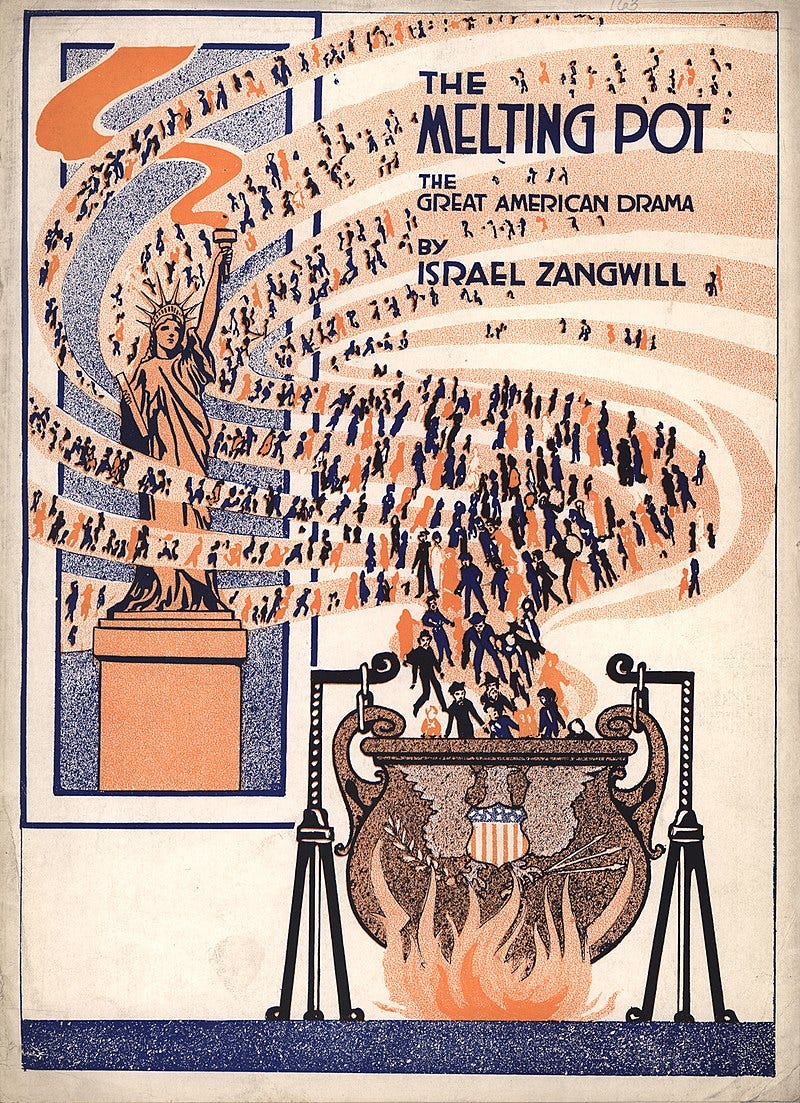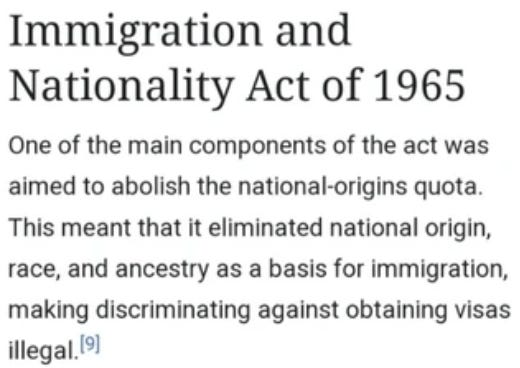The Truth Behind The Melting Pot
Deboonking and Correcting Certain Misconceptions [Sep 30, 2023]
Most of you by now have heard of the “Melting Pot of America” and how it is supposedly an integral part of American history and culture. We’ve all heard snarky liberals compare the unending latinx hordes plaguing our border to Ellis Islanders during the 20th century as if they are the same thing. We know it’s not, and they probably do as well but they’re just disingenuous.
The most important takeaway from this post is the fact that Israel Zangwill did not create the idea behind the ‘melting pot’. He co-opted the idea from many noted American thinkers dating as early as the 18th century, and modified it for his own purposes. It is important that right wingers understand this, because we are NOT opposed to immigration, we are opposed to certain shades of immigration.
Something I’ve noticed about the types of people to go on and on about the melting pot are themselves usually non-White while also being Union apologists. This is usually because they operate under the assumption that America used to be a wholesome and inclusive haven for BIPOCs and hard working TradCaths everywhere. Not so. America has always been the land of the WASPs, and even the most staunch Unionists/Abolitionists still argued that non-Whites were inferior, they just opposed the institution of slavery on religious grounds.
All historical examples of the “melting pot” referred almost exclusively to Europeans.
Contemporaries would have you believe that America was, for most of its history, highly receptive of non-White immigrants, but that is not the case. Non-Whites were, at most, an afterthought to these writers. Ralph Waldo Emerson only begrudgingly included Africans and Polynesians into his idea of a “smelting pot” because they were already there anyways, and Zangwill himself only added Jews into the mix (himself a Jew). Contextually, these aren’t very surprising. Ralph Waldo Emerson, a famous abolitionist, naturally included Africans (though it should still be noted he believed they were inferior to Whites), and Zangwill’s inclusion of Jews in his play was itself quite liberal for the time, since Jews were still not considered White (rightly so).
Historical Context
But enough of that, lets get into the meat of the argument. The first example of this “melting pot” comes from J. Hector St. John de Crèvecœur’s Letters from an American Farmer (highlighted in blue):
Notice, in yellow, how he believes that it is best that these ethnicities retain their own unique cultures rather than adopting a new one. This was the norm for most of American history, until the federal government took action to break up these ethnic enclaves.
The first (public) usage of the phrase is, to my knowledge, from a magazine article written by Titus Munson Coan:
The fusing process goes on as in a blast-furnace; one generation, a single year even—transforms the English, the German, the Irish emigrant into an American. Uniform institutions, ideas, language, the influence of the majority, bring us soon to a similar complexion; the individuality of the immigrant, almost even his traits of race and religion, fuse down in the democratic alembic like chips of brass thrown into the melting pot.1
The first example, period, that I am aware of can be found in Ralph Waldo Emerson’s personal journal (written in 1845, published in 1912):
so in this continent, — asylum of all nations, —the energy of Irish, Germans, Swedes, Poles, and Cossacks, and all the European tribes, — of the Africans, and of the Polynesians, — will construct a new race, a new religion, a new state, a new literature, which will be as vigorous as the new Europe which came out of the smelting-pot of the Dark Ages, or that which earlier emerged from the Pelasgic and Etruscan barbarism. La Nature aime les croisements.2
Fredrick Jackson Turner, in his essay The Significance of the Frontier in American History wrote that:
The Scotch-Irish and the Palatine Germans
[…]
Very generally these redemptioners were of non-English stock. In the crucible of the frontier the immigrants were Americanized, liberated, and fused into a mixed race, English in neither nationality not characteristics.3
The Noticing
The most well-known example, however, is of course Israel Zangwill’s play of the same name, particularly this quote:
Understand that America is God's Crucible, the great Melting-Pot where all the races of Europe are melting and re-forming! Here you stand, good folk, think I, when I see them at Ellis Island, here you stand in your fifty groups, your fifty languages, and histories, and your fifty blood hatreds and rivalries. But you won't be long like that, brothers, for these are the fires of God you've come to—these are fires of God. A fig for your feuds and vendettas! Germans and Frenchmen, Irishmen and Englishmen, Jews and Russians—into the Crucible with you all! God is making the American.
-David Quixanos4
Less known, however is that this was heavily inspired by the sonnet The New Colossus written by Emma Lazarus (another Jewish writer) in 1883:
Failed to render LaTeX expression — no expression found
Even LESS well-know would be the fact that A Nation of immigrants, a book written by JFK which discussed the idea that America was built on the backs of immigrants and their descendants, was commissioned by the ADL. Former ADL National Director Ben Epstein was concerned with anti-immigrant sentiment in the 1950s, and so he reached out to JFK (then a senator) to write a manuscript. JFK was assassinated before the book was finished, but it was posthumously published in 1964.5
Ok I am going to stop this tangent now, you all know what I’m getting at and it’s probably in my best interest to stop.
Legal History
Many of you have probably seen this image before, known as the Naturalization Act of 1790 which restricted naturalization (and thus citizenship) to “free White individuals of good character” thus excluding literally all non-Whites and, under the interpretation of the law at the time, non-Christians from citizenship.6 There were relatively minor amendments to the law following this, which are listed below:
1795: Extended residence requirement to 5 years and implemented a notice of 3 years for application.
1798: extending residency requirement to 14 years and the notice period to 5 years.
1802: Repealed the 1798.
1804: Women’s citizenship tied to marital state.
1831: Treaty of Dancing Rabbit Creek, Choctaw natives remaining in Mississippi were granted citizenship.
1868: 14th Amendment, granted citizenship to all individuals born in the US, regardless of race (excluding untaxed natives).
1870: Extended naturalization laws to Africans and those of African decent, while revoking the citizenship of naturalized Chinese.
1898: United States v. Wong Kim Ark, effectively undid the Chinese exclusion to the 14th Amendment
1924: Indian Citizenship Act, blanket citizenship to all Native Americans born afterwards.
Major changes would not be made until the Immigration and Nationality Act of 1952
However, this was was not seen as “effective” enough and so the Immigration and Nationality Act of 1965 (otherwise know as the Hart-Celler Act) was enacted. This is the prevailing piece of immigration legislature today.
As you all well know, this was passed with the assurance that his would not upset the ethnic balance of the United States.
“our cities will not be flooded with a million immigrants annually. [...] Secondly, the ethnic mix of this country will not be upset” -Senator Edward Kennedy
“Our cultural pattern will never be changed as far as America is concerned.” -Senator Hiram Fong
"This bill we sign today is not a revolutionary bill. It does not affect the lives of millions. It will not restructure the shape of our daily lives." -President Lyndon B. Johnson
“Immigrants from Asia and Africa will have to compete and qualify in order to get in, quantitatively and qualitatively, which, itself will hold the numbers down.” -Representative Emanuel Celler
“5,000 immigrants would come the first year, but we do not expect that there would be any great influx after that.” -Attorney General Robert Kennedy
“This bill is not designed to increase or accelerate the numbers of newcomers permitted to come to America. Indeed, this measure provides for an increase of only a small fraction in permissible immigration.” -Attorney General Nicholas Katzenbach
“It is obvious in any event that the great days of immigration have long since run their course.” -Representative Sidney Yates
"Contrary to the opinions of some of the misinformed, this legislation does not open the floodgates." -Senator Claiborne Pell
Taken from The Legacy of the 1965 Immigration Act
Many of these individuals were asked about the immigration of specific groups, and then gave their estimates. They were very wrong.
Secretary of State Dean Rusk was asked about the number of Indian immigrants, and stated there would be around 8,000 immigrants in the next five years. There were 27,859, over three times as many.
Senator Hiram Fong was asked about the number of Asians, giving a figure of 5,391 in the next five years and claimed that Asians would never make up more than 1% of the U.S. population. The actual number was 19,399, over three times as many and today Asians make up over 6% of the U.S.
Clearly, none of what these people said was true.
Border encounters exceed 617,000 so far in fiscal year 2023, a record high
Biden makes border history with most immigrant encounters in August ever recorded
Conclusion
The intention of this post is to provide source material for people concerned by recent immigration and the rhetoric surrounding it. I don’t seek to build a narrative beyond what the sources say (that is for another time), but to instead provide like minded individuals with the material to combat immigration rhetoric and dismiss the ill-informed notion that contemporary immigration policy is in any way supported by American history. As such, I have tried to provide as many primary sources as I could and to put some of the arguments you may have heard into their proper context.
Titus Munson Coan. "A New Country", in The Galaxy Volume 0019, Issue 4 (April 1875), p. 463. Digital copy provided by HathiTrust.
Ralph Waldo Emerson. Journal, Volume 7 (1845-1848), p. 116. Archive.org
Fredrick Jackson Turner. The Significance of the Frontier in American History, (1893), p. 17. Archive.org
Israel Zangwill. The Melting Pot, (1908).










Knew that arditi.jarty was going to flop. A reactionary splinter based off 2 banwaves with shit programming isn't gonna bring many faces over.